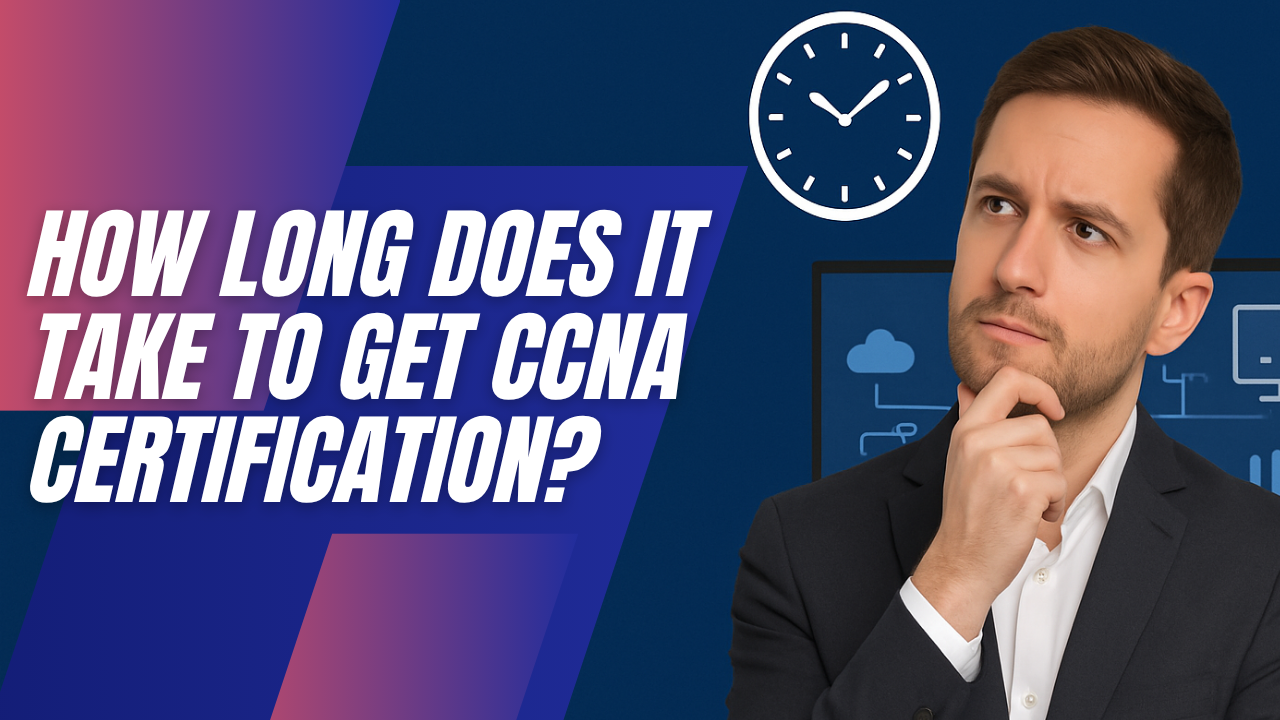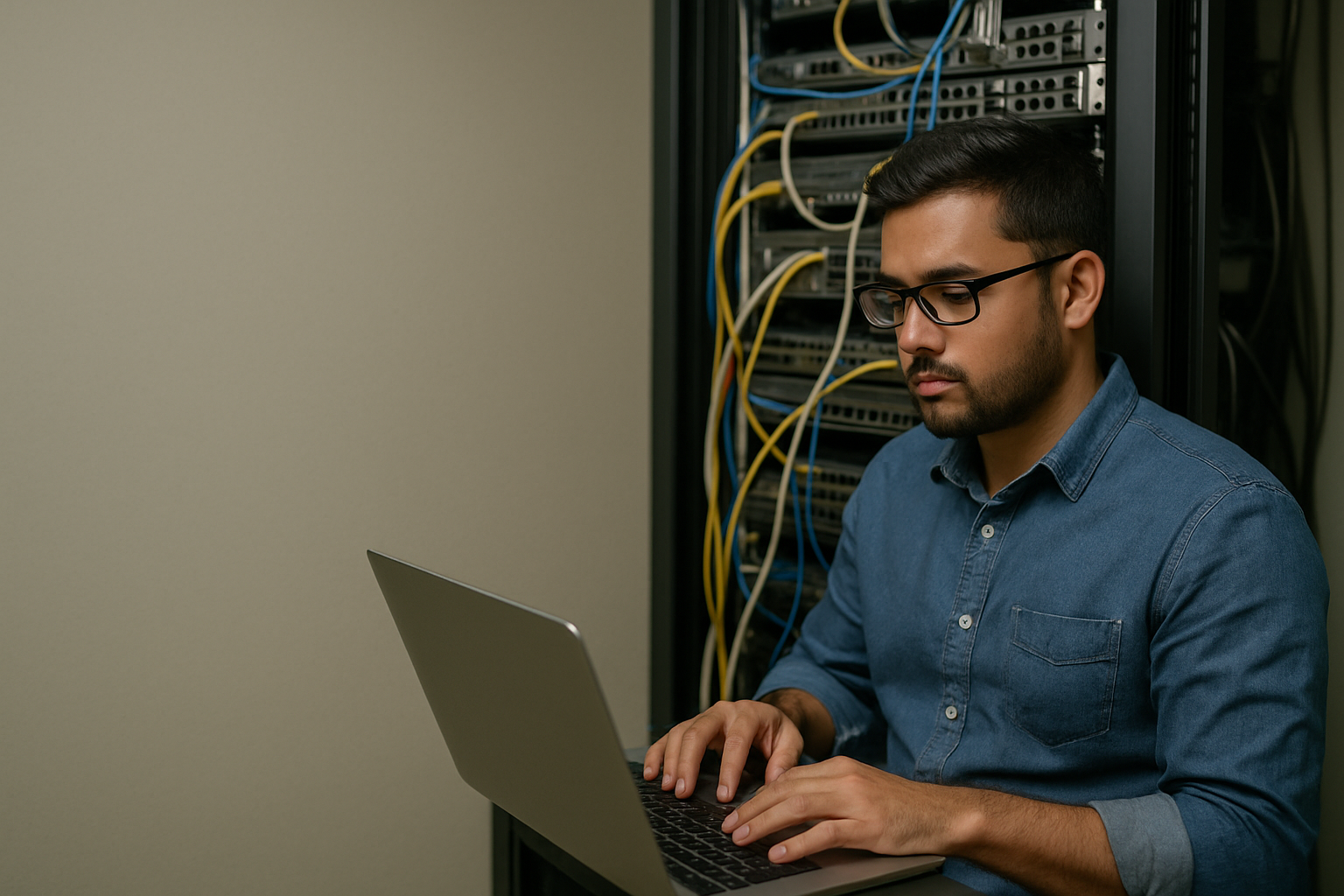CCNA Course: What It Includes, Fees, Duration & How to Learn
Most of our interaction today happens in a digital society and this enables networking as an invisible force that promotes effective data exchange and communication.
Automation in modern networking technology has not only increased the operational efficiency of organizations, it has also opened numerous opportunities for skilled professionals. Automated tools in network management have helped organizations address issues without much human intervention.
With the emerging latest technologies such as cloud computing, IoT, and 5G, the demand for networking professionals has grown significantly. Most organizations prefer cloud-based solutions as they wish to expand their business activities worldwide. Working remotely has become a new normal, with the ultimate aim of getting the work done without much delay.
If you are a CCNA certified networking professional, you can help to reduce the troubleshooting time and complete assigned tasks on time. By getting this certification, you can gain essential skills and knowledge to design, build, manage and troubleshoot networking systems.
What is the CCNA Course?
The Cisco Certified Network Associate (CCNA) is an entry-level certification that helps you explore the best practices in networking and its principles. It is recognized globally as an essential certification in networking.
The course covers the basics of networking, security, automation and IP connectivity. This certification authenticates your ability to configure, install, operate, and troubleshoot issues in network infrastructure. In short, this certification is an important stepping stone for job aspirants who want to pursue a career in networking.
Earlier there were options to choose from various CCNA specializations. Now, Cisco has consolidated them into one that covers a range of topics. It helps to streamline the certification process.
The latest exam code is 200-301 CCNA. The certification demands knowledge based on networking theories and its practical application. One who appears for the exam must be familiar with the basic configuration and operation of switches and routers and theoretical knowledge on those topics also.
The Cisco Certified Network Associate (CCNA), an entry-level information technology (IT) certification, is issued by Cisco, the networking hardware organization.
The CCNA certification course validates your knowledge on fundamental networking concepts that are essential for networking professions in the IT sector. Becoming a CCNA-certified professional is one of the significant steps you are taking towards a promising career.
As Cisco has been offering a wide range of products, in addition to routers and switches, that have been widely used across the world. CCNA certification is vendor-specific as its products have been largely utilized in the networking market.
The CCNA certified experts connect remote sites with the wide area network (WAN) system and resolve security threats with their expertise in systems administration. The certification helps the networking professionals to install, design, operate and troubleshoot router and switch systems.
Remember CCNA as a virtual gateway for you to become a networking expert because it focuses on fundamental concepts in detail. It prepares you to get recruited as network specialist, network administrator, and network engineer in the IT sector.
What Does the CCNA Course Include?
The CCNA certification course curriculum covers network security, IP addressing, switching, routing, and automation in detail. The knowledge gained from this course offers expertise that helps you to implement, design and troubleshoot from small to medium-sized networks.
The CCNA certification course is also considered the base for pursuing advanced certification courses further and choosing your specialized career as a network administrator, a network engineer or a cybersecurity professional.
-
- Network fundamental concepts deal with cabling, network topologies, and basic networking concepts that include OSI and TCP/IP models.
-
- IP connectivity deals with subnetting, IP addressing and routing protocols such as OSPF, and EIGRP.
-
- IP services deal with Dynamic Host Configuration Protocol (DHCP), Network Address Translation (NAT) and Network Time Protocol (NTP) concepts.
-
- Wireless technologies deal with the basics of wireless networking which includes WLANs and WLAN security.
-
- Security fundamentals deal with the basics of Firewalls, basic network security principles and VPNs.
-
- Automation & Programmability focuses on introduction to network automation that includes programming languages like Python and network tools.
Other CCNA specializations
The CCNA Security certifications focus on the principles of network security, firewalls, VPNs, threat detection and mitigation. For security-focused careers, Cisco now offers CCNP Security and Cisco CyberOps Associate as alternatives.
The Cisco certified Network Professional (CCNP) which is the next level certification has several specializations that you can choose from which is based on your chosen career path.
Who Can Do the CCNA Course?

If you are a job aspirant with an undergraduate degree in Computer Science, Engineering, or Information Science, you can choose CCNA certifications. It is also suitable for IT professionals who want to advance in their career as network administrators and students who pursue degrees in electronics, IT, and Computer Science.
If you are a job aspirant who wants to become a system administrator, network engineer or a security specialist, you can choose CCNA certification. CCNA certification programs have specific skill set groups. Every group has different levels of complexity that helps you gain good knowledge in that particular topic.
In addition to these skills, CCNA aspirants must be good at troubleshooting, communication, and customer service. With good analytical and organizational skills, they must also be familiar with Microsoft Office Suite. In addition, they must also have the ability to use networking tools specific to the industry.
Though there are no pre-requirements to appear for the certification exam, some experience in handling network systems is expected.
To be a CCNA certified professional, you have to clear the 200-301 CCNA exam.
CCNA Course Duration

It depends upon your choice of getting prepared for your certification exams. If you choose self-paced learning, it may require diligent preparation from two to six months. You can use Cisco’s officially recognised books and study materials.
If you are going to choose any instructor-led training program offered by Cisco certified training institutes, it may extend from three to six months. If you are going to choose any one of the intensive online courses offered by institutes such as Cisco Networking Academy, LINT, you may be able to get yourself ready within six to eight weeks.
If you utilize the hands-on virtual labs offered by training institutes it will help you to reinforce your learning. It depends upon your prior knowledge about networking systems and the hours you can allocate for your exam preparation. The CCNA certification exam (200-301) may need your preparation time from three to six months to clear the exam easily.
Beginners with no prior networking experience need to spend at least 10 to 15 hours per week, so that they can get ready within three to six months. Candidates with some networking knowledge need to spend at least 8 to 12 hours per week, so that they can get ready within two to three months.
Experienced candidates who are working in the networking systems need to spend at least 5 to 10 hours per week, so that they can get ready within one to two months.
CCNA Course Fees & Costs

The cost of CCNA training and certification differs based on the location, institute and the training mode. For online courses, the training fee ranges from ₹7,000 to 12,000.
For classroom training, the cost significantly varies from institution to institution in different cities. In metro cites, it approximately ranges from ₹7,000 to 30,000.
CCNA Certification Exam Fees
The official CCNA certification exam costs $300 plus applicable taxes. As of Mar 2025, including taxes, this amounts to approximately ₹30,300.
Comparing self-study vs. instructor-led training
To help aspirants appearing for the CCNA certification, Cisco U, the learning network platform from Cisco provides a range of tutorials along with relevant resources. The time you need to prepare for the exam depends on the networking knowledge you already have and also how quick you can update yourself with the latest information.
It is good to have a study plan with regular practice of what you learnt. If you are ready to dedicate a few hours every week, six months is more than enough to get thorough with the curriculum and be confident to appear for the exam. It is better to focus on one topic at a time and review what you have learnt.
As you need in-depth preparation, it is good to use multiple resources. Online programs at LINT can help you to learn from anywhere with a flexible time schedule. With our state-of-the art virtual labs, we provide a simulated environment with real-time network issues, to improve your understanding of network concepts. You can also refer “CCNA 200-301 Official Cert Guide” by Wendell Odom is highly recommended as it covers all exam topics. Feel free to join the CCNA Prep program by Cisco to get valuable guidance from experts.
What Are the Career Benefits of CCNA?
Jobs after CCNA certification
IT organizations mostly look for job aspirants who have CCNA certification for it authenticates their expected knowledge and proficiency in networking technologies.
A Cisco certified aspirant can get recruited as Network Administrator, Network Engineer, Network Security Specialist, Systems Engineer, Network Engineer, IT Manager, Network Trainer and so on.
Being globally recognized, the CCNA certification has been highly acclaimed in the IT sector and it stands as a solid proof for your networking skills. With this certification you can also opt for professions with excellent growth in cybersecurity, cloud computing, space, defense and virtualization etc.
Salary expectations
A CCNA certified network professional will draw a higher salary depending mainly on the industry, location and level of experience.
In India, an experienced CCNA certified professional can expect to get a salary around ₹ 7 Lakh per annum and a fresher can expect to get a salary around ₹ 4 Lakh per annum. As you gain experience with focus on what you are good at, you may get a highly rewarding career in the networking system.
How CCNA helps in career growth
After your CCNA certification, you can be promoted as a Network Analyst or a Network Engineer or a Network Administrator or a Network Support Engineer or a Security Analyst. As a Network Engineer, you will have the responsibility of implementing, designing and configuring the network structures.
As a Network Analyst you will have to identify issues and the root causes of the issues on the network. For efficient functioning of the network, as a Network Administrator you will have to supervise and control the network processes. You will also be helping clients to identify network issues and solutions. As a Security Analyst you will have to secure the network infrastructure from cyber threats.
What Can You Do After CCNA?
After completing the CCNA course, you can apply for entry-level jobs like Network Engineer, System Administrator, or IT Support Specialist. You can also pursue higher Cisco certifications like CCNP (Cisco Certified Network Professional) or CCIE (Cisco Certified Internetwork Expert). You can specialize in cybersecurity, cloud networking, or network automation.
How to learn the CCNA course?
The exam topics and the strategy for learning, studying and practicing are the two important things you need to focus on while preparing for your certification.
If you can successfully complete the tasks defined for each topic, you can confidently appear for the exam.
Training options to prepare for the certification:
-
- Use the Cisco Learning Locator to find instructor-let courses both in person and virtual.
- Joint LINT for expert led and self paced online course with virtual lab.
-
- For books, check the Cisco Press CCNA 200-301 Official Cert Guide, Volume 2, and add it to your study plan.
-
- The CCNA Preparation Bundle can help you prepare for the 200-301 CCNA exam.
-
- The Implementing and Administering Cisco Solutions CCNA Learning Path will help you build skills you need to install, operate, configure, and verify basic networks, when you are preparing to take the 200-301 CCNA exam.
-
- The Cisco Exam Review: CCNA helps you to prepare for your CCNA exam. It will help you gain practical experience for exam topics by testing your knowledge, skills, and abilities.
In addition to how you prepare for your exam, it is important to get hands-on-experience by practice. This is practicing in a lab environment. Your ability to execute critical tasks will be tested on the exam, so it is important to practice early and often in a lab environment.
Explore Cisco Modelling Labs
Prepare for your certification with this powerful network virtualization and orchestration platform. Cisco Modeling Labs – Personal enables you to create highly accurate network simulations in a safe virtual environment.
How to Schedule through Pearson VUE
Cisco certification exams are administered by Pearson VUE, a Cisco testing partner, as proctored exams.
You have to create a Cisco.com ID and link it to Pearson VUE. Choose online proctoring
(home-based) or in-person testing at a Pearson VUE centre. Submit payment through
Cisco Learning Credits or credit card.
You need to arrive 45 minutes early for in-person exams and for remote testing you must take the exam in a distraction-free environment.
Post-Exam Steps and Recertification
Claiming Certification
Upon passing, candidates receive a digital badge via Credly. You can check Cisco certification status through Cisco’s Certification Tracking System. Your physical certificate will arrive by mail within 6 to 8 weeks.
Maintaining CCNA Validity
The CCNA certification expires after three years. Renewal options include passing a higher level exam such as CCNP Enterprise. (350-401 ENCOR).
Conclusion
To attain the CCNA certification, exam aspirants must receive training from authorized Cisco Training Partners. CCNA certified professionals can perform better than non-certified professionals as Cisco is a leader in networking technologies. It also offers core networking knowledge for future specializations also.
FAQs
Yes. Even if you are a BA or B.Com graduate you can pursue a CCNA course. CCNA focuses on networking fundamentals, anyone interested in networking can choose this irrespective of the degree you have.
Yes, Electronics and Telecommunication (EXTC) students can also choose the CCNA course. The certification course covers networking concepts that are relevant to their field of study.
An online CCNA course can provide you with the much needed networking system knowledge. But practical experience and hands-on lab exposure are important to get selected. You will get a good job depending on your overall skill set and the available market demand.
While CCNA is a valuable certification course, you may need real-time exposure to networking systems, network security, troubleshooting etc., to get the job. For recruitment, IT organizations typically look for freshers who are good with soft skills, some exposure to networking, and a valid certification.
You can go through the entire CCNA course content within 15 days. But mastering the expected skills requires your effort to spare quality time and practice to gain expertise. Gaining in-depth understanding of technical aspects usually takes longer time than expected.
The CCNA course focuses mainly on networking concepts and device configuration. It does not require extensive computer programming knowledge. Your basic scripting knowledge may be helpful for automation to a certain extent.
No, a B.Tech background is not required. Individuals with varying educational backgrounds and with an interest in networking systems can opt for this course.
You can apply for a CCNA course through training centres, Cisco’s authorized training partners, and online learning platforms like LINT. You can self-study with the officially recognized study materials and apply for the exam.
The CCNA course provides you with fundamental networking knowledge, which is helpful for understanding network security and its vulnerabilities. However, ethical hacking requires additional specialized training in cybersecurity. CCNA is not a hacking course.
Yes, a laptop is a must to practice networking simulations and network configuration. It is also needed to practice with tools such as GNS3 or Cisco Packet Tracer.
CCNA refers to both the course and the professional certification exam. Passing the exam certifies you have essential skill and knowledge in networking systems.






